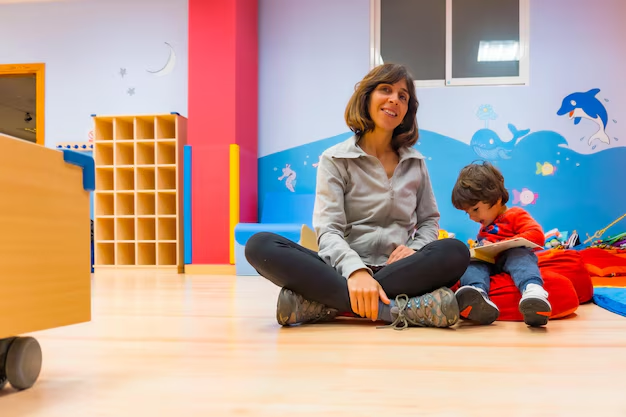Unlocking Campus Childcare: A Guide for Student Parents
Navigating the complex world of higher education is a challenging task, but for student parents, the stakes are even higher. Balancing academics, parenting, and sometimes work can be a daunting trifecta. This is where on-campus childcare facilities come into play, offering a lifeline of support. Let's take an insightful look into the role these facilities play in supporting student parents and how you can make them work for you.
The Growing Demand for Campus Childcare
Being a student parent is no longer an anomaly. Colleges and universities are witnessing a rise in the number of students juggling academic and parenting responsibilities. With the demands of coursework compounded by parenting duties, many are turning to on-campus childcare as a solution to better manage their time and commitments.
Why Student Parents Opt for On-Campus Childcare
Convenience: Proximity is a massive advantage. Parents can drop their children off nearby and focus on their studies without venturing far from campus.
Cost-Effective Solutions: Many institutions provide subsidized rates which can be significantly less expensive than private childcare centers.
Community Support: On-campus childcare offers a chance to bond with other student parents, creating a supportive network.
Challenges Student Parents Face
Despite their proven value, on-campus childcare facilities are not without their challenges. Limited spots can lead to long waiting lists, and availability varies widely from school to school. Furthermore, balancing the times these centers operate with class schedules requires careful planning.
Understanding the Structure of On-Campus Childcare
Types of Childcare Facilities
There are generally two types of facilities on offer:
- Full-Day Care: Designed for parents who have a full day of classes or work. Perfect for those whose schedules mirror a traditional workday.
- Part-Time Programs: These are ideal for students who need childcare on a more flexible basis, such as for an afternoon seminar or weekly lab session.
Key Features to Look For
When evaluating on-campus childcare options, consider the following attributes:
- Qualified Staff: Ensuring caregivers are well-trained and certified.
- Safe Environment: Check for clean facilities and proper safety protocols.
- Enriching Activities: Look for programs that offer educational and playful activities to aid in your child's development.
Steps to Accessing On-Campus Childcare
Initial Research
Start by investigating what your campus offers. Most institutions will provide detailed information on their websites. If not, contact the student services office.
Application Process
- Check Eligibility: Requirements can differ; some centers prioritize specific groups like single parents or those enrolled in full-time study.
- Join Waiting Lists Early: If demand is high, getting your application in as early as possible is crucial.
- Prepare Documentation: You may need to provide proof of enrollment, financial need, or your child's medical information.
Budgeting for Childcare Costs
While subsidized, on-campus childcare is not free. Understand the fee structure, what’s included, and any potential for financial aid. Planning for these expenses in your overall education budgeting can lessen financial stress.
Insights into Child Development Benefits
Educational institutions provide unique settings that blend childcare with early education models. This exposure can be beneficial in several ways:
- Social Skills Development: Interaction with peers helps children develop interpersonal skills.
- Pre-School Readiness: Programs often incorporate learning activities that align with pre-school curricula.
- Exposure to Diversity: Being on a campus introduces children to a diverse population, fostering early acceptance and understanding of different cultures.
Building a Support Network
Being a student parent can feel isolating, but you're not alone. Many campuses encourage community building through:
- Parent Groups: Participate in groups that offer both emotional support and practical advice.
- Workshops and Seminars: Attend events that focus on parenting skills, time management, and stress relief.
- Resource Centers: Most schools have resources aimed at student parents, from counseling services to financial aid workshops.
Future Trends in Campus Childcare
Expansion and Innovation
As the demand grows, universities recognize the need for investment in childcare facilities. Expect to see expanded facilities, increased capacity, and innovative programs that integrate learning and care.
Digital Integration
The roll-out of apps and digital platforms is revolutionizing how parents interact with childcare facilities. From instant updates on your child's day to seamless activity scheduling, technology is making it easier to stay connected.
📝 Quick Tips for Student Parents
- Plan Ahead: Apply early and research thoroughly.
- Utilize Resources: Engage with support services and community events.
- Stay Informed: Keep abreast of childcare policies and changes on your campus.
- Build Connections: Foster relationships with other student parents for mutual support.
- Focus on Balance: Prioritize your time between academic obligations and parental duties.
The journey of being a student parent is paved with unique challenges and opportunities. On-campus childcare is more than a convenience; it’s a catalyst for academic and personal success. By understanding and utilizing these resources, student parents can create a positive, nurturing environment that allows both parent and child to thrive. Empower yourself with knowledge and community, and make the most of this transformative college experience.

Related Topics
- A Comprehensive Guide To Community Cooperative Childcare: A Grassroots Solution
- A Guide To Online Second-Hand Shopping: Platforms, Tips, And Tricks
- Affordable After-School Programs And Clubs: A Complete Guide
- Affordable Group Therapy: Benefits And How To Find
- Affordable Natural Therapies For Mental Well-being
- Avoiding Financial Scams And Pitfalls: A Comprehensive Guide
- Backpacking On a Budget: A Guide For The Minimalist Traveler
- Beginners Guide To Thrifting: Stretching Your Dollar Further
- Beyond Clothing: Thrifty Finds For Home And Kitchen
- Budget-friendly Garden Start-ups: From Seeds To Harvest
